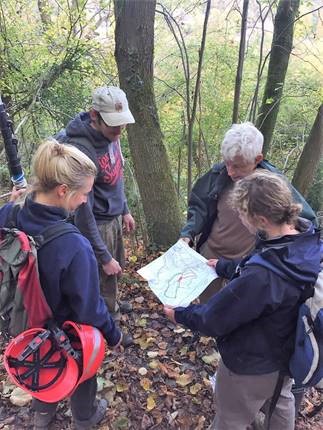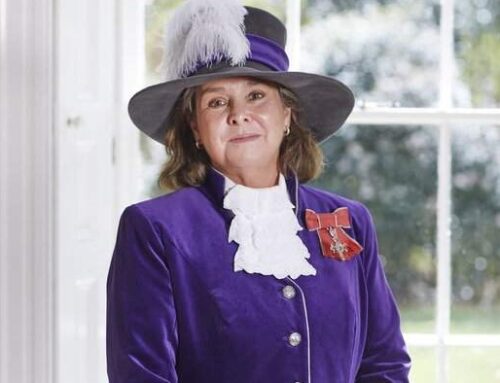Earlier this month a team from the Royal Botanic Gardens, Kew were in Shropshire collecting seeds from spindle and looking for an old population of large-leaved lime as part of The UK National Tree Seed Project – set up by Kew’s Millennium Seed Bank, with funding from players of People’s Postcode Lottery.
Tree seeds collected as part of the project will be safely banked in the underground vaults of Kew’s Millennium Seed Bank – forming the UK’s first national collection of tree seeds. These seeds then play a vital role in conservation work to protect UK trees and woodlands, including research against pests and diseases such as ash dieback. The collections, and associated data, will be available to researchers working on solutions to tackle the many threats facing our woodlands.
First on the trip, the team visited Wenlock Edge to collect the vibrant pink fruits of spindle, a species known to occur more frequently on soils rich in limestone or chalk, ready to transport them back to the Millennium Seed Bank, where scientists can curate, monitor and germinate the banked seeds.
Later on in the week, on the same trip, Kew teamed up with the Severn Gorge Countryside Trust (SGCT) to identify and collect seed from large-leaved lime trees on the steep slopes of Benthall Edge SSSI, within the Ironbridge Gorge World Heritage Site. The limes were originally mapped by Dr George Peterken for SGCT in the early 1990’s and the Kew team returned to assess how well this old population was seeding and to verify the individual trees. As the species is only suspected to be native in woods on calcareous soils the choice of site is important to ensure nativeness. Although no seeds were collected from limes during this trip, assessing the population and verifying this difficult to identify species will enable tree climbers to tackle seed collection next season.
Following collection, the spindle fruits were back to Kew’s Millennium Seed Bank, where they were immediately removed from the covering fruit to prevent fermentation and then dried in a special temperature and humidity-controlled environment. Finally, they were sent to be stored in the vault at –20°C. The seeds should remain viable for many decades and will be available to support research and on-the-ground conservation activity.
Following the collecting trip Ian Willey, Fieldwork Officer for the UK National Tree Seed Project, said “It was great to start the week of with a fantastic seed collection from ten spindle plants, an inconspicuous plant in Britain’s woodlands until late autumn when it’s branches are adorned with bright pink fruits encasing equally eye-catching orange seeds.
“Large-leaved lime is at the edge of its natural distribution in the UK, preferring the hotter summers of central and southern Europe for seed production. However, with this year’s unusually long and hot summer it felt as good a time as ever to find fruiting lime populations. With help from our friends at SGCT we have hopefully identified a population of native large-leaved lime trees which were producing seed.”
Clare Trivedi, UK National Tree Seed Project Co-ordinator at The Royal Botanic Gardens, Kew, says, “Building up our seed collections of the nation’s favourite and most important tree species is a vital step in combating the multiplying pests and diseases which threaten to alter our landscape dramatically.”
The UK National Tree Seed Project launched in 2013 with the aim of securing genetically diverse collections of UK native trees and shrubs. The target species include many which underpin the UK’s wider plant and animal diversity, as well as supporting woodland industry, tourism and recreation, such as ash, juniper, Scots pine, alder, beech, silver birch and yew. So far more than 12.5 million seeds have been collected for The UK National Tree Seed Project from over 8000 individual trees across the UK. The project has also received more than 1000 seed collections from partners across the country.
Pictured
Working with Severn Gorge Countryside Trust (SGCT) to assess a large-leaved lime population within the Ironbridge Gorge World Heritage Site. RBG Kew staff Anna Pajdo and Fran Culverhouse. SGCT staff Nathan Morris and Russell Rowley. Photo, RBG Kew.








